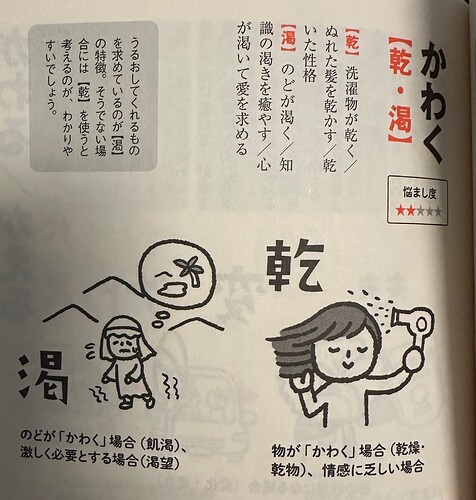I’ve had a few clusters of vocab throw a wrench in my gears - terms that seem like they are not directly interchangeable, but I can’t quite pin down the difference in usage. I’d like to submit my understanding for the “feel” of these terms for critical review; anyone who knows better that’d be willing to tear up my ideas or confirm them is appreciated.
For the sake of brevity I’m not going to reproduce them, but know that I’ve at least read the cursory Jisho, Yomitan, Reddit, Hinative, Quora (yeah, I know), etc stuff you’d get via a websearch and my doubts persist in spite of them - or sometimes made worse!
のどが渇く vs 乾く・ I think this one is the most straightforward? のどが渇く is the more generic/normal “I’m thirsty”. 乾く has the same meaning, just more intense - if perhaps a bit anachronistic due to the literal «to become dry» definition. It doesn’t seem all that much of a stretch to me and I see instances of both ‘in the wild’. If could imagine someone I know saying “Hey man, you got any water? I’m fucking dried out.” and it wouldn’t weird me out at all.
細かいお金 vs 小遣い・ I get the feeling 細かいお金 is more straight forward: coins or even small bills. 小遣い feels like more of “this is what I got on me to spend right now”. To me this makes more sense if you imagine a world without ubiquitous credit card/Suica/Pasmo use. Even if you are talking about your own money, you’d have to go to the bank to get it. Thus, until you go to the bank, the $300/¥30000 or whatever in your pocket really is all your spending money/allowance.
幸せ・幸い・嬉しい・幸福・喜ぶ
- 「幸せ」 Vanilla, everyday way to express happiness
- 「幸福」 Similar meaning to 幸せ, but a more profound connotation. The difference in saying “I’m happy” and “I pray for happiness”.
- 「喜ぶ・嬉しい」 Both more instantaneous responses than simple 幸せ, ie reactions to a temporal event, in the moment. However 喜ぶ is a bit more of the external display of jubilation vs a delight you feel in your heart/gut. For instance, give a group of kids candy and they might be 喜ぶ. Whereas 嬉しい is something you might feel if your coworker tried to get you a present in line with your tastes, when previously you thought no one cared about you at work. I feel like the Venn diagram of these has a lot of overlap?
- 「幸い」 I’m the most unclear on this one. As far as I can figure out, this usually is a “business people doing business things” kinda word? Like something you’d see in a business email. “I would be so fortunate/blessed were you to check the document I sent you.” Which is kind of in line with the hyperbolic nature of most sonkeigo/kenjougo. Though I see plenty of examples on immersionkit, so I realize this isn’t a office-only word. I internalize the meaning of 幸い as somewhere between “to be blessed” - sans any explicit religious connotation - and the phrase “I would be happy to do that for you”.
Just to be explicit, I’m not confidently stating the aforementioned to be fact. Rather, it is my “definition headcanon” being submitted for peer review.

